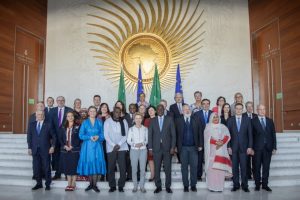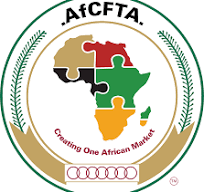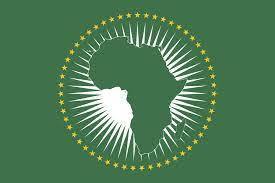Highlights of 10th African Union Commission – European Commission meeting
Last week Thursday, the 10th African Union Commission – European Commission meeting held in Addis Ababa, Ethiopia; it was aimed at an enhanced partnership between the 2 continental unions, ahead of the AU-EU ministerial meeting holding May 5, 2020 and the 6th EU-AU summit holding later in 2020

The one-day meeting which was co-chaired by the chairperson of the AU Commission, Moussa Faki Mahamat and the president of the European Commission (EC), Ursula von der Leyen, took note of progress on the priorities set in the 2017 Abidjan Declaration, focusing on alignment of the AU-EU positions on sustainable growth, trade, investment and digitalization; peace, security and governance; migration and mobility; as well as climate change and resilient infrastructure. Across all the priority areas, the two sides reiterated their commitment to supporting multilateralism as an effective modality in addressing global challenges.
On sustainable growth, trade, investment and digitalization, the European Commission welcomed the entry into force of the African Continental Free Trade Area (AfCFTA), and the ongoing implementation of its first phase, stressing the importance of the second phase of negotiations on competition policy, intellectual property, and the investment protocol, which aim to enhance investment policy climate and address risks facing businesses and investors. Consequently, the two Commissions agreed on the need to prioritise regional infrastructure as an underpinning element of the AfCFTA.
Moreover, the duo agreed to maximise synergies between European and African private sectors in view of the next EU-Africa Business Forum, as well to promote actions focused on the diversification of African economies by developing the private sector and strengthening productive capacity in agriculture; manufacturing and services; value-addition in national and regional value chains; supporting regional and trans-continental transport; as well as promoting digitalization.
The two commissions also agreed to improve domestic resource mobilisation in Africa through reforms, tax revenues, tax transparency, international asset recovery, fighting Illicit Financial Flows (IFFs), money laundering and corruption; as well as intensifying efforts to enhance youth skills development and better match skills with the demands of the labour market. Thus, the duo agreed to intensify efforts to enhance youth skills development and better match skills with the demands of the labour market, particularly in sectors with the highest job creation potential, notably infrastructure development, digital economy and climate-friendly-green economy, renewable energy, ICT, agri-business and small-scale manufacturing, cultural as well as creative industries.
In order to better connect the two continents and accelerate growth for the achievement of the SDGs and AU Agenda 2063, the AUC and EC agreed to establish a digital partnership based on a shared vision on an open and secure digital economy, and which puts African and European citizens at the centre of the digital transformation. Accordingly, they agreed that Africa and Europe harness the many opportunities offered by digitalisation to drive innovation and transformation, building on the work of the EU-AU Digital Economy Task Force. They also noted the significance of the AU’s Digital Transformation Strategy by Africa, in this direction.
On climate change and resilient infrastructure, the two Commissions took cognizance of the challenges posed by climate change to the development of both Africa and Europe; underscored the need for collaboration in the development and implementation of programmes aimed at facilitating the implementation of Nationally Determined Contributions (NDCs); enhancing capacity and development of clean technologies; as well as improving access to climate finance and promoting investments in climate change related projects. In recognition of infrastructure’s vital role in accelerating socio-economic development, they pledged continues support for the Programme for Infrastructure in Africa (PIDA) and the Single African Air Transport Market (SAATM).
Regarding peace, security and governance, both sides stressed the urgency of adapting and upscaling cooperation to better respond to the changing nature of common threats, notably the spread of terrorism and violent extremism, trafficking and transnational crime including cybercrime and for action-oriented measures to curb the persistent illicit flow and use of arms and weapons into the African continent. Furthermore, the two commissions emphasised cooperation in financing of African-led peace initiatives and in the promotion of multilateralism, conflict prevention, crisis management and peace building, health security as well as recognizing the strategic significance of the revitalised AU Peace Fund.
On migration, mobility, youth, skills and innovation, the duo agreed to deepen cooperation and dialogue on migration and mobility, and expressed commitment towards developing a joint framework for a strengthened Continent-to-Continent dialogue on migration and mobility. They agreed to reinforce joint strategic management of refugees, migration and mobility at the continental level, guided by the respective migration policy frameworks of the two continents. In this respect, the two Commissions agreed to work together to develop concrete proposals on all these matters for consideration by the EU-AU summit later in 2020.
Regarding youth economic empowerment, the two Commissions took note of the progress realised in the implementation of agreed priorities in education, science, technology, innovation and skills development, notably the AU-EU Skills for Youth Employability Programme, and also agreed to support implementation of the AU’s Continental Education Strategy for Africa (CESA). They agreed on the need to strengthen cooperation by expanding vocational education and training (VET) mobility, apprenticeship and other work-based learning and career guidance to address skills mismatch.
The 10th AUC-EC Commission-to-Commission (C2C) meeting is considered as critical building block of an enhanced partnership between the AUC and EC; it was backed by the appropriate framework and instrument and its agreements would be solidified by mutual commitments at the AU-EU ministerial meeting, holding on 5 May 2020 and consequently the sixth EU-AU summit much later in the year.














